Civil Rights
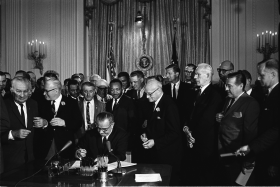 /tiles/non-collection/o/oh_evnt_cr_cra1964_lbjlib.xml
Photograph by Cecil Stoughton, courtesy of the LBJ Library
On July 2, 1964, President Lyndon B. Johnson signed the Civil Rights Act of 1964 into law.
/tiles/non-collection/o/oh_evnt_cr_cra1964_lbjlib.xml
Photograph by Cecil Stoughton, courtesy of the LBJ Library
On July 2, 1964, President Lyndon B. Johnson signed the Civil Rights Act of 1964 into law.
Video
Discrimination in the Capitol
Representative Kanjorski discusses racial relations at the Capitol during his Page service.
Surrogate Representation
Discussion of the role Representative Lindy Boggs and other women in Congress played as surrogate representatives.
First Woman Elected to Congress from Alabama
George Andrews discusses his mother's role as the first female Member of Congress elected from Alabama.
First African-American Member on the House Armed Services Committee
Representative Dellums describes an important meeting with Speaker of the House Carl Albert of Oklahoma, and his historic appointment to the House Armed Services Committee.
Sharing a Chair on the First Day
Representative Dellums recalls the unusual circumstances he and Congresswoman Pat Schroeder of Colorado faced on their first day on the House Armed Services Committee.
Consequences of Historic Appointment
Representative Dellums reflects on how his appointment to the House Armed Services Committee affected the Congressional Black Caucus.
The Voting Rights Act of 1965
Detailed account of Louisiana Representative Hale Boggs' decision to speak on behalf of the 1965 Voting Rights Act.
Significance of Being the First Female Page for the House of Representatives
Reflections on the lifetime impact of the Page experience.
Campaign to Become First Female Page
Felda Looper reflects on her first meeting with then Majority Whip Carl Albert of Oklahoma.
Congresswoman Helen Meyner of New Jersey
Recollections of Congresswoman Helen Meyner of New Jersey and gender barriers in the Democratic Cloakroom.
Memories of Historic Legislation
Civil Rights legislation and reflections on breaking racial barriers in the House of Representatives.
Audio
Change Is Coming
Reflections on the changing southern attitudes towards civil rights legislation.
Cognizant of Making History
Reflections on the historical significance of being the first female House Page.
Historical Milestones
Reflection of the significance of being the first African-American House Page to serve in the U.S. House of Representatives in the 20th century.
On Being the First African-American Woman on the Force
Reflection on what it meant to be the first African-American woman on the Capitol Police Force.
Reflections on Being the Only Woman on the Day Shift
Description of the reactions of and resistance by male officers.
Images & Artifacts
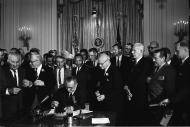 /tiles/non-collection/o/oh_evnt_cr_cra1964_lbjlib.xml
/tiles/non-collection/o/oh_evnt_cr_cra1964_lbjlib.xml
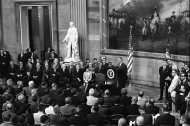 /tiles/non-collection/o/oh_evnt_cr_vra1965_lbjlib.xml
/tiles/non-collection/o/oh_evnt_cr_vra1965_lbjlib.xml
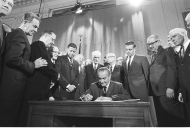 /tiles/non-collection/o/oh_evnt_cr_cra1968_lbjlib.xml
/tiles/non-collection/o/oh_evnt_cr_cra1968_lbjlib.xml
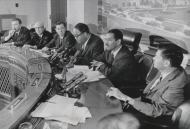 /tiles/non-collection/o/oh_evnt_cr_selmahearing_hc.xml
/tiles/non-collection/o/oh_evnt_cr_selmahearing_hc.xml
About this object
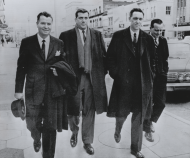 /tiles/non-collection/o/oh_evnt_cr_selma_congressmen_hc.xml
/tiles/non-collection/o/oh_evnt_cr_selma_congressmen_hc.xml
About this object











 ;
;
 ;
;
 ;
;
 ;
;
 ;
;